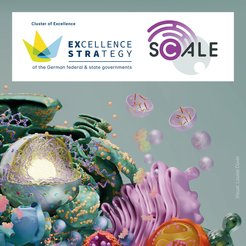SCALE Selected as a DFG Excellence Cluster
We are proud to announce that the SCALE cluster initiative: Subcellular Architecture of Life, has been selected as a Cluster of Excellence by the German Research Foundation (DFG) following a highly competitive evaluation process.
Text: Pamela Ornelas
Based at Goethe University Frankfurt Riedberg campus, SCALE tackles a fundamental question in biology: How is the intricate architecture of cells formed, maintained, and transformed, especially under conditions of stress, aging, and disease? By advancing this frontier, SCALE aims to reshape our understanding of cellular organization.
On 22 May 2025, the DFG's Excellence Commission selected 70 research clusters to receive funding under Germany’s Excellence Strategy. The Commission recognizes scientific programs of the highest standards, such as SCALE, which will be funded for an initial seven-year period, strengthening Germany’s international competitiveness in life sciences.
We heartedly congratulate the entire SCALE team and thank the spokespersons Inga Hänelt, Michaela Müller-McNicoll and Martin Beck for their vision and leadership in shaping the cluster over the past years. Michaela Müller-McNicoll is a Max Planck Fellow at the Max Planck Institute of Biophysics, where Martin Beck also serves as Director. All three are professors at Goethe University Frankfurt.

SCALE brings together 55 research groups across seven German institutions: Goethe University Frankfurt, the Max Planck Institute of Biophysics, the Max Planck Institute for Brain Research, Frankfurt Institute for Advanced Studies (FIAS), Johannes Gutenberg University Mainz, Universität des Saarlandes, and the Hessian Ministry for Science and the Arts. United by a common goal, they aim to uncover a new understanding of biological self-organization through cutting-edge technologies.
Central to this mission is the development of detailed digital models of subcellular environments, called digital twins. These twins will allow researchers to simulate, manipulate, and predict cellular behavior in unprecedented ways, setting the stage for a new era in molecular life sciences.
In addition, graduate training is a cornerstone of SCALE’s strategy. The cluster includes a dedicated graduate center, SCALE-it, in partnership with Goethe University and FIAS. SCALE-it offers workshops, lectures, and hands-on training tailored for PhD students, along with financial support for research stays, conferences, and career development.
At the Max Planck Institute of Biophysics, we are proud to have been closely involved in the SCALE initiative from the beginning. All of our current directors and many faculty members have actively contributed to shaping the cluster and supporting its success. Moreover, our International Max Planck Research School on Cellular Biophysics (IMPRS-CBP) is closely aligned with SCALE, sharing faculty, students, and a mission to uncover the deepest principles of cellular architecture through interdisciplinary training and world-class research.
Martin Beck, Director of the Molecular Sociology department at our Institute and one of the SCALE spokespersons, reflects on the vision behind the cluster and its future:
“The SCALE research program has been inspired from that of the IMPRS on Cellular Biophysics. But it is even more forward looking. Its vision is to understand complex biological phenomena by integrating various types of data into computer simulations of sub-cellular segments, coined digital twins of cells. SCALE will combine the strength in experimental and theoretical science of several institutes from Campus Riedberg and elsewhere. It will synergize very well with the research done on mitochondria, the nuclear envelope, autophagy or membrane proteins at the MPI of Biophysics."
Further reading:
- Visit SCALE’s website here.
- Learn more about the SCALE-it graduate center here.
- Read the original announcement by the DFG here.












